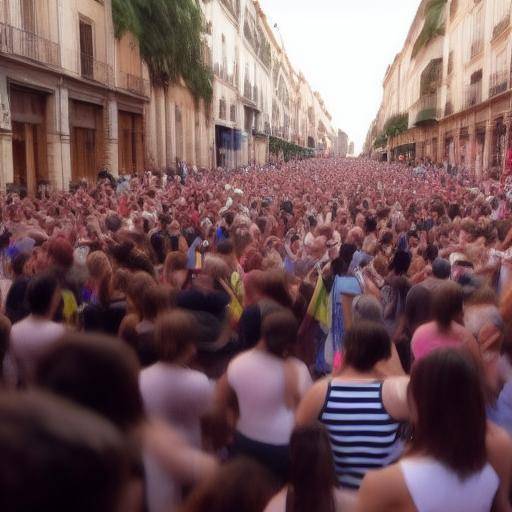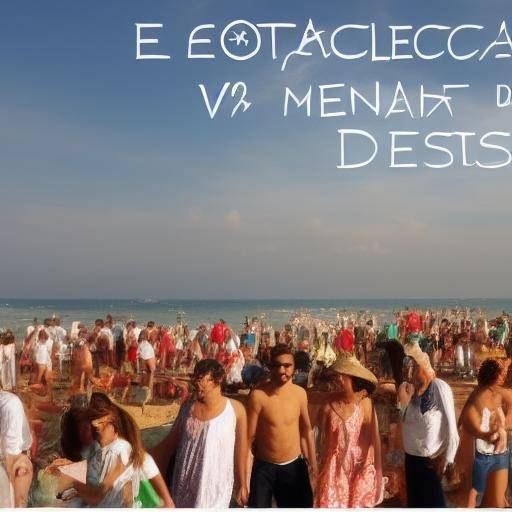
La. Fête de la Musique It is a vibrant annual event held in France and in various parts of the world that celebrates music through free concerts in public spaces, giving musicians of all styles the opportunity to exhibit their art. This unique event takes place every 21 June, coinciding with the summer solstice in the northern hemisphere. Throughout this article, we will explore the rich history and cultural importance of _Fête de la Musique_as well as the exciting experiences it offers both musicians and music lovers. In addition, we will analyze the connection between France, the free concerts and the solstice, highlighting how this special event brings together music, the community and the celebration.
History and Background
La. Fête de la Musique was conceived in 1982 by the then Minister of French Culture, Jack Lang. Inspired by the appreciation of music as a form of cultural expression and the idea of making it accessible to all, Lang proposed the idea of a day when music would take the streets, parks and squares, offering free concerts for the enjoyment of the population. The proposal was quickly adopted and on 21 June 1982 marked the beginning of this musical festival that has since acquired a huge popularity in France and has been adopted in many countries, becoming a global event.
La. Fête de la Musique it has become an emblematic celebration that promotes musical diversity, community participation and the festive spirit. Fan and professional artists, street musicians, local bands and renowned interpreters, all meet to give a day of cheerful and eclectic music to the audience, turning the streets into live and vibrant scenarios. This event contributes significantly to the promotion of music in all its forms, as well as the promotion of inclusion and social cohesion through art.
Analysis in Deep
La. Fête de la Musique offers a multitude of benefits for both artists and the public. Emerging musicians can find an invaluable platform to get to know, while listeners have the opportunity to discover new talents and enjoy live performances free of charge, in a relaxed and festive atmosphere. However, the organization of a major event is not exempt from logistical and economic challenges. From security management and noise control to funding and advocacy, there are several aspects to consider to ensure the success and sustainability of the Fête de la Musique.
The concept of free concerts is fundamental in the Fête de la Musique, as it underlines the philosophy of accessibility and musical diversity that promotes the event. Music becomes a gift for the community, expanding access to culture and fostering active participation and collective enjoyment. The celebration of the solstice, which marks the beginning of the summer, coincides symbolically with the explosion of joy and vitality that causes music in its various manifestations, making this day a tribute to light, creativity and celebration.
Exhaustive examination
La. Fête de la Musique has inspired many initiatives around the world, taking unique forms and adapting to different cultural contexts. The experiences and lessons learned in the various celebrations of this festival offer valuable knowledge about the organization of outdoor musical events, the involvement of the community and the cultural impact. Sharing these practices and reflections can enrich the planning and execution of similar events, enriching the cultural and social fabric of the communities.
The perspectives of musicians, organizers and attendees provide valuable views on the Fête de la Musique, illustrating its impact and relevance from various angles. This variety of voices enriches the understanding of the event, highlighting its role as a cultural catalyst and social change agent. In addition, the analysis of the advantages and challenges associated with free concerts in public spaces contributes to the development of effective strategies to maximize benefits and mitigate obstacles.
Comparative analysis
France, with its rich musical tradition and appreciation for the arts, offers an ideal context for the celebration of the Fête de la Musique. The intimate connection between French music and cultural identity is manifested in a vibrant way at this annual event, which reflects the diversity and vitality of the country's musical landscape. Free concerts become a genuine expression of generosity and openness, radiating joy and summoning people of all ages and backgrounds to celebrate together.
The solstice, with its symbolic meaning and seasonal influence, enhances the festive atmosphere of the Fête de la Musique. The change of season, marked by the summer solstice, is intertwined with the musical rhythms and melodies that fill the air, creating an atmosphere of exuberance and energy. This fusion of temporary and musical elements accentuates the collective experience and highlights the unifying power of music in everyday life.
Practical Tips and Accessible Recommendations
For musicians wishing to participate in the Fête de la Musique or for the organizers who are contemplating similar events, there are practical suggestions that can enrich the experience for all those involved:
- Early planning: Start planning well in advance to address logistical and promotional aspects.
- Involve the community: Encourage the active participation of the community to strengthen the sense of belonging and musical diversity.
- Gender diversity: Promote a wide range of musical styles to ensure the inclusion of different tastes and audiences.
- Safe spaces: Ensure that the spaces where concerts are held are safe and welcoming for all.
These recommendations, supported by successful experiences and lessons learned, can significantly improve the planning and implementation of outdoor music events, fostering the participation and appreciation of music in the community.
Industry Perspectives and Expert Reviews
The opinions of experts in the field of music, culture and the organization of events provide a profound insight into the importance and impact of the Fête de la Musique. Trend analysis, reflection on the evolution of the event and future projections enrich the understanding of this cultural phenomenon, offering valuable guidance on how to maximize its potential and value in the future.
Case Studies and Real Life Applications
Analysis of practical cases and concrete examples of implementation Fête de la Musique in different cultural and social environments illustrates the versatility and transformative impact of this event. These enriching experiences provide valuable insights on the adaptation of the concept of free concerts and the incorporation of the solstice as an emblematic element in similar celebrations in other parts of the world, highlighting the ability of music to unite people across borders and cultures.
Future Trends and Predictions
The Future of the Fête de la Musique and similar events promises to continue to evolve to embrace new forms of musical expression and adapt to social and cultural changes. The predictions about the growth and expansion of this global celebration point to its consolidation as a significant cultural milestone, capable of inspiring and enriching the lives of communities around the world. The integration of innovative and technological elements in the organization and promotion of Fête de la Musique represents an exciting opportunity to expand its reach and impact, strengthening its traditional roots with a contemporary and global vision.
Conclusions and FAQs
In short, the Fête de la Musique is positioned as an emblematic event that celebrates music in an inclusive, festive and meaningful way. By joining artists and audiences around music in their various forms, this festival reflects the cultural wealth and unifying power of music in society. As it evolves and expands, the Fête de la Musique promises to continue to inspire new generations of musicians and music lovers, strengthening community ties and enriching the global cultural landscape.
FAQs
1. What is the origin of the Fête de la Musique?
La. Fête de la Musique was proposed by the French Minister of Culture, Jack Lang, in 1982 as a celebration of music through free concerts in public spaces.
2. Why the Fête de la Musique is it celebrated on 21 June?
The date coincides with the summer solstice in the northern hemisphere, marking the beginning of the summer and providing a symbolic context for the musical celebration.
3. What kind of events can be found in the Fête de la Musique?
La. Fête de la Musique offers a wide variety of free concerts ranging from individual performances to band shows and collective shows in public spaces.
4. What is the impact of the Fête de la Musique in the local community?
La. Fête de la Musique promotes musical diversity, provides a platform for emerging artists and strengthens community ties by bringing people together through music.
5. How can I participate in the Fête de la Musique as a musician?
To participate in the Fête de la Musique as a musician, you can contact the local authorities, event organizers or public spaces that participate in the celebration.
6. What are the benefits of attending the Fête de la Musique as a public?
As an assistant, you can enjoy a wide range of free musical performances in a festive and participatory atmosphere, exploring new musical genres and supporting local artists.
By researching and exploring key elements related to Fête de la Musique, a rich and multifaceted world of emotions, experiences and meanings is revealed. Music, as a universal language, finds in this celebration an unbeatable scenario to express its vitality and to unite people through their melodies and stories. What a magnificent way to celebrate musical diversity and foster a sense of community, where the streets become scenarios for free artistic expression and collective celebration in the splendour of the solstice.
May music continue to flood our lives with its joy and ability to unite us!


